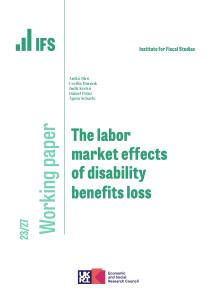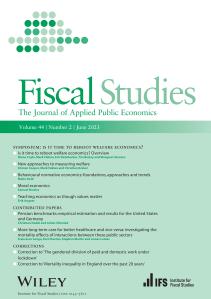Headlines about house prices, rent levels, the collapse in rates of owner-occupation among the younger generation and, indeed growing homelessness abound.
One thing that, unaccountably, gets rather less coverage is housing benefit — the benefit paid to those on low incomes to help to cover the costs of rent. There are occasional spats over things such as the “bedroom tax” — a reduction in entitlement for those in social housing deemed to have more bedrooms than they need — but little focus on the system as a whole.
It is a curious omission. The government spends an astonishing £22 billion a year on housing benefit. That dwarfs spending on the police, on overseas aid and the budgets of many entire government departments. Spending on this one benefit has doubled since the early 2000s. More than four million households receive it. All that is true despite repeated cuts in generosity such that for most working-age people it covers a lower proportion of their actual rent than was the case in the past.
This matters for multiple reasons. First, it is an awful lot of money. Second, as a means-tested benefit affecting large numbers of people, housing benefit can have substantial effects on work incentives. Third, this scale of spending is itself a reflection of many of the other problems we face in the housing market. Fourth, spending on this scale could itself be exacerbating some of those problems, potentially pushing up rents and acting as a transfer to landlords. And fifth, cuts in recent years mean that, despite the scale of spending, many families are left struggling to pay their rent and to cover other living expenses.
The main drivers of the increase in spending have been the rapid expansion of the private rented sector alongside increased rents in social housing, in part because cheaper council housing has been in decline. If you own your own home, you are not eligible for housing benefit, so the collapse in rates of owner-occupation has played an important role. Rents in the private sector are much higher than those in the much-diminished local authority sector. So the benefit system has a bigger job to do than it had in the past. A system that looked manageable when it was mostly supporting those facing below market rents in the social sector and a relatively small private sector looks much harder to maintain as it provides support to increasing numbers facing full market rents in a much-expanded private sector. Low levels of owner-occupation are passing on substantial costs to the public purse.
That’s the sense in which failures elsewhere in the housing market are creating problems. One thing we don’t know is the extent to which housing benefit itself is creating a problem. If you’re paying that much money to that many people to cover their rent, you might expect that to push up the market level of rent. I say we don’t know because there isn’t a lot of robust evidence telling us that is definitely happening, and indeed some evidence that it doesn’t happen in the short term. But it must be a risk.
That risk used to be greater. Historically, benefit levels were tied directly to rent. For most of those on the lowest incomes, their rent would be covered fully and if the rent rose, so would the benefit.
Rents and benefit entitlements in the private sector have now been mostly de-linked. Entitlements today largely depend, bizarrely, on local rents in 2012 and, in particular, on rents at the 30th percentile of the local market rent back then (except in some London boroughs, where national caps bite in an effort to prevent rent being paid by the state in respect of very expensive properties).
That has the benefit of capping spending and reducing the chance that rents will rise, because any increase simply will be paid for by the state. But because, across the country, entitlements have risen less quickly than rents over the past six years, more and more low-income families are having to find more and more money to pay rents that they can ill-afford. Not only that, the discrepancy between entitlement and local rent levels now varies dramatically across the country. If you live in Liverpool and have no private income, your housing benefit will still cover your full rent if you live in a property in the lowest 30 per cent of local rents. In Greater Manchester you’ll be left with more than 15 per cent of the rent to pay and in much of London you’ll need to come up with more than a quarter of the rent bill from somewhere.
Even so, if you are entitled to a three-bedroom property, perhaps because you are a couple with two older children, you can easily be entitled to more than £300 a week in London and more than £200 a week in parts of the South East. Many people in that position are trapped on benefits. They can’t earn enough to break free of the benefits system and because of the way in which housing benefit is withdrawn at a rate of 65p for every pound as earnings rise, the financial gain from earning more is limited, especially when other benefits and tax credits are also being withdrawn. Universal credit, by being withdrawn less quickly, will do something to help this problem, but it will, in turn, make it harder for renters to move off benefits entirely.
In the long run, the solution to these issues can’t come from the housing benefit system itself. The trade-offs are inescapable. It will come from fixing the underlying problems — high rents, high house prices, inadequate social housing. The doubling in the housing benefit bill is merely the very expensive canary in the coalmine.
This article was originally published in The Times and is reproduced here with full permission. Paul Johnson is director of the Institute for Fiscal Studies. Follow him on @PJTheEconomist.








